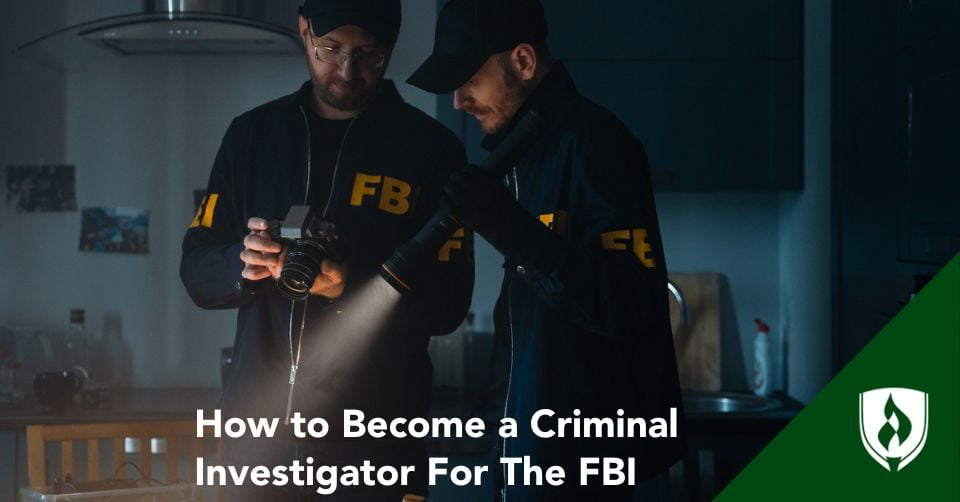
The FBI employs approximately 35,000 people, according to the organization itself. This number includes everyone from scientists to intelligence analysts and language specialists to criminal investigators.1
Criminal investigators (also called detectives, agents or special agents) undergo specialized training programs and investigate a wide range of federal crimes. If you're fascinated by this role, you might well be wondering how to become a criminal investigator for the FBI.
Here are some quick definitions to get you fully up to speed, and a step-by-step breakdown of how to become an FBI agent—one of the 35,000 people employed by this top-secret organization.
What is an FBI special agent?
Detectives and criminal investigators, who are sometimes called agents or special agents, gather facts and collect evidence of crimes, according to the U.S. Bureau of Labor Statistics (BLS).2 An FBI agent is one that does this specifically for the FBI.
What does FBI stand for?
FBI stands for Federal Bureau of Investigation. “Federal” refers to the national government of the United States. “Bureau” is another word for a department or division of government. “Investigation” is what an FBI agent does—gathering facts and evidence to solve and prevent crimes.
What exactly is the FBI?
The FBI is an intelligence-driven and threat-focused national security organization with both intelligence and law enforcement responsibilities, according to the FBI itself. It is the principal investigative arm of the U.S. Department of Justice, and a full member of the U.S. Intelligence Community.
The FBI investigates specific crimes assigned to it and provides other law enforcement agencies with various services. These include things like fingerprint identification, laboratory examinations and training.
An FBI agent also gathers, shares and analyzes intelligence. They support FBI investigations, the investigations of partners and to generally better understand and combat the security threats facing the United States.
Put super simply? The mission of the FBI is to protect the American people and uphold the Constitution of the United States.
What do FBI agents do?
FBI agents, criminal investigators or agents enforce many different federal laws and perform various roles. While there's no "typical day" for these professionals, there are some common tasks and duties they fulfill.1
What tasks do FBI agents typically have?
FBI agents in field offices may do things like testify in federal court, execute search warrants and gather evidence. They may meet with sources to gather intelligence on illegal activities and make arrests.1
They'll typically spend time in the office as well, collaborating with squad members and catching up on paperwork. Some FBI agents work in specialized areas like training, fingerprinting, lab services and public affairs, and many also work as supervisors or managers.1
Where do FBI special agents work?
Though FBI agents will spend time both in the field and in the office, special agents are always on call and may be transferred at any time. Because of this, they may end up relocating multiple times over the course of their careers. If you want to become an FBI agent, this is definitely something to keep in mind. 1
Though it's definitely not a typical nine-to-five career, agents will still have opportunities to spend time with their families and away from work.1
How do you become a criminal investigator for the FBI?
Now that you know a little bit about what FBI agents do and where they work, let's get to the how. Here are six different requirements and steps to becoming an agent, detective or criminal investigator for the FBI.
1. Meet the age requirements
To be eligible to become an FBI special agent, you must be at least 23 years old. You must also apply before your 36th birthday, unless you have veteran’s preference or federal law enforcement experience.2
You must complete every step of the Special Agent Selection System (SASS) and start on duty no later than the day before your 37th birthday.2
2. Fulfill the legal criteria
To be eligible for employment by the FBI (for any position) you must be a United States citizen, and your public record must be in good standing, with no felony convictions. Your student loan repayments must also be in good standing, and you must have filed all required annual federal, state and local taxes.3
FBI applicants must also adhere to the FBI drug policy, be current on any court ordered child support payments and demonstrate no engagement with organizations designed to overthrow the United States government. Though exceptions apply, any applicants assigned male at birth will also typically need to register with the Selective Service System.3
In addition to all of the above, aspiring FBI special agents must also possess a valid driver’s license, meet certain physical fitness requirements and be able to be able to obtain a Top Secret Sensitive Compartmented Information (SCI) Clearance.2
They'll also need to meet the following educational and professional work experience requirements.
3. Meet education and work experience requirements
FBI special agents must have a bachelor’s degree and at least two years of full-time professional work experience, or have an advanced degree (such as a master's degree or higher) and at least one year of full-time professional work experience.
Some common degrees for a career in criminal investigation include law enforcement, a bachelor's degree in criminal justice, security and protective service and the social sciences.
Rasmussen University does not offer any programs that lead to credentials in security and protective services and social sciences.
Please note—FBI agents and criminal investigators don't walk into their positions right after school. You'll need to gain professional experience in law enforcement or similar field first. It is important to check the specific education and work experience requirements that are needed to pursue a career as an FBI agent or Criminal Investigator.
4. Pass the required tests
The SASS process includes multiple tests at different stages. From the Phase I test to the Phase II test and the Physical Fitness Test (PFT) to the medical exam, there are a variety of required tests to pass, and some that you'll need to pass multiple times over the course of your training.5
5. Receive a Conditional Appointment Offer (CAO)
Once you pass the necessary tests, you'll receive a Conditional Appointment Offer (CAO). This means you have an offer, but you'll be officially hired and appointed only once you successfully complete the remaining steps and requirements.5
6. Pass the background investigation
Another key step of the FBI agent application process is passing the background investigation. The FBI conducts background investigations on all FBI applicants,6 but those seeking a special agent position must complete a background investigation specifically to obtain a Top-Secret Sensitive Compartmented Information (SCI) Clearance.5
This includes a Personnel Security Interview (PSI), polygraph examination, drug test, fingerprinting and a medical examination. It also includes credit and arrest checks, interviews with associates and references and the verification of educational achievements.
This process averages around six months, but it can take more than 18 months depending on factors like where you have lived, worked and traveled.5
7. Complete the mandatory training
All special agents begin their career at the FBI Academy in Quantico, Virginia. This process—which includes the Basic Field Training Course (BFTC)—involves 16 to 20 weeks of living on campus through intensive training both in and outside the classroom.
Areas of study include the fundamentals of law, behavioral science, report writing and forensic science, plus basic and advanced investigative, interviewing and intelligence techniques.
Agent trainees will also learn the intricacies of counterterrorism, counterintelligence, weapons of mass destruction, cyber and criminal investigations to prepare them for their chosen career paths. They'll undergo intensive training in physical fitness, defensive tactics, practical application exercises and the use of firearms.
8. Demonstrate the skills FBI agents need
Throughout the entire SASS process, applicants will be evaluated based on the FBIs Core Competencies listed below.7 The more you've naturally honed these skills over the course of your education, work and life experience, the more prepared you'll likely be.
- Collaboration
- Communication
- Flexibility and adaptability
- Initiative
- Interpersonal ability
- Leadership
- Organization and planning
- Problem solving and judgment
All of these skills and strengths are important, and it goes to show how much "soft skills" matter even in a field as physical and technical as criminal investigation.
Interested in learning more about working for law enforcement agencies like the FBI?
If you think you might have what it takes to join this challenging and exciting career path within the criminal justice system, then you should keep learning more. Law enforcement, becoming an FBI agent or a special agent all starts with a bachelor's degree.
Check out What Should I Know Before Studying Criminal Justice? 10 Things to Keep in Mind to see what this type of program will teach you.
1FBI, What tasks do FBI agents typically perform?, Special Agent Eligibility(11/20/2024), What tasks do FBI agents typically perform? — FBIJOBS (https://www.fbi.gov/about/faqs/what-does-an-fbi-agent-do-on-a-typical-day)
2Bureau of Labor Statistics, U.S. Department of Labor, Occupational Outlook Handbook, Police and Detectives, (date accessed), Police and Detectives : Occupational Outlook Handbook: : U.S. Bureau of Labor Statistics (https://www.bls.gov/ooh/protective-service/police-and-detectives.htm#tab-2)
3FBI Jobs, FBI Eligibility, (11/20/2024), Eligibility and Hiring | FBIJOBS (https://fbijobs.gov/eligibility#fbi-eligibility)
4Bureau of Labor Statistics, U.S. Department of Labor, Occupational Outlook Handbook, Police and Detectives, (11/20/2024), Police and Detectives : Occupational Outlook Handbook: : U.S. Bureau of Labor Statistics (https://www.bls.gov/ooh/protective-service/police-and-detectives.htm#tab-4)
5FBI Jobs, Special Agent Selection System, (11/20/2024), Special Agent Application and Evaluation Process | FBIJOBS (https://fbijobs.gov/special-agents/application-and-evaluation-process#sass)
6FBI Jobs, What type of applicants does the FBI investigate?, (11/20/2024), What type of applicants does the FBI investigate? — FBI (https://www.fbi.gov/about/faqs/what-type-of-applicants-does-the-fbi-investigate)
7Federal Bureau of Investigation, Core Competencies, (11/20/2024), Core Competencies (https://fbijobs.gov/sites/default/files/2022-05/Guide_CoreCompetencies_1.pdf)




